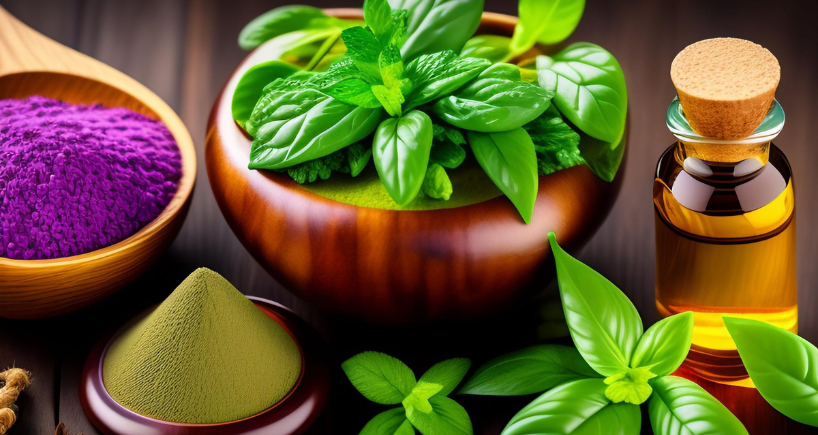
The Healing Powers of Tulsi: 7 Surprising Benefits of Tulsi Leaves
In the realm of Ayurveda, adapting a lifestyle enriched with regular use of herbal ingredients has the potential to combat various illnesses. Research indicates that regular use of various herbal products has shown remarkable benefits. Among these, Ocimum sanctum Linn., commonly known as Tulsi or basil, has been particularly highlighted for its significant contribution to addressing various ailments. Emerging evidence suggests that Tulsi can address ailments related to the body’s chemistry, metabolism and emotions, offering a unique blend of pharmacological effects that help reduce stress. In this blog, we explore the healing power of Tulsi and uncover the surprising benefits of Tulsi leaves.
Seven surprising benefits of Tulsi leaves
- Respiratory issues: Tulsi is a key ingredient in Ayurvedic expectorants and cough syrups. Boiled basil leaf water can soothe a sore throat and treat respiratory illnesses. Decoctions with honey and ginger can treat bronchitis, asthma, influenza, cough and colds.
- Kidney stones: Tulsi leaf juice mixed with honey strengthens the kidneys and helps expel renal stones after consistent use for six months.
- Cardiovascular diseases: Basil helps with heart issues and reduces cholesterol levels in the blood.
- Treating illnesses in children: Basil leaf juice treats common paediatric ailments like vomiting, diarrhoea and fever.
- Stress and headaches: Basil leaves act as an adaptogen, providing significant protection against stress. Chewing 12 basil leaves twice a day reduces stress and purifies the blood.
- Mouth infections: Chewing basil leaves treats oral ulcers and infections.
- Teeth disorders: Basil leaves can be used to wash teeth after being powdered and sun-dried. A paste made from basil and mustard oil can be used as a dental paste, helping with gum massage, bad breath and oral health.
Clinical significance of Tulsi
Beyond those benefits, numerous studies on Tulsi have demonstrated restorative benefits, further enhancing its overall value. Tulsi is rich in phytochemicals, antioxidants and essential oils that are known to strengthen the neurologic, cardiac and immune systems. Here are some of the clinical values:
- Tulsi, or Ocimum sanctum, has been extensively studied for its protective effects against various toxicants. It has been found effective against pesticides like endosulfan, chlorpyrifos and lindane, as well as industrial chemicals such as carbon tetrachloride, ethanol and copper sulphate.
- Tulsi also counters the harmful effects of pharmaceutical treatments like paracetamol, acetaminophen and anti-tuberculosis medications. Additionally, it protects against the toxic effects of heavy metals like mercury, copper, chromium and cadmium.
- Tulsi increases antioxidant enzymes like superoxide dismutase, catalase and glutathione, which protect cells by neutralising harmful free radicals caused by oxygen deprivation and toxins.
- Reduces DNA damage and induces apoptosis in cancerous cells, slowing tumour growth and improving survival rates.
- Enhances liver detoxification through cytochrome P450 enzymes, aiding in the safe metabolism and excretion of harmful substances.
How to consume Tulsi?
Tulsi can be consumed safely in various ways. Some of them include:
- Tulse tea: The most popular method is preparing Tulsi tea decoction, which offers numerous health benefits. Add fresh or dried Tulsi leaves to boiling water, let it steep and enjoy.
- Tulsi-infused ghee or honey: Infusing ghee or honey with Tulsi leaves can enhance their medicinal properties. This mixture can be directly consumed or can be used as an additive.
- Tulsi juice: Fresh Tulsi leaves can be juiced and consumed for a potent health boost. This juice can be taken on its own or mixed with other juices.
- Tulsi water: Soak Tulsi leaves in water overnight and drink the infused water in the morning for a refreshing start to your day.
- Direct consumption: Tulsi leaves can be added directly to your tea or other beverages and consumed regularly.
Tips for managing your lifestyle safely with Tulsi
While Tulsi is generally safe and has no adverse side effects during human clinical trials, there are some precautions to consider:
- Pregnancy and lactation: Expert suggests that pregnant women, those trying to conceive, and lactating mothers avoid consuming Tulsi. The effects of Tulsi on infants, children and nursing mothers are not well-documented.
- Initial consumption: When trying Tulsi tea for the first time, it may cause nausea and diarrhoea. Begin with small quantities and gradually increase your intake to allow your body to adjust.
- Blood sugar levels: Tulsi is very effective in lowering blood sugar levels. People on diabetes medication should consume Tulsi with adequate precaution and closely monitor their blood sugar levels.
Conclusion
Always seek medical advice before incorporating Tulsi into your diet, especially if you are pregnant, nursing, elderly or have young children. This will help prevent any potential side effects and ensure safe consumption.



















